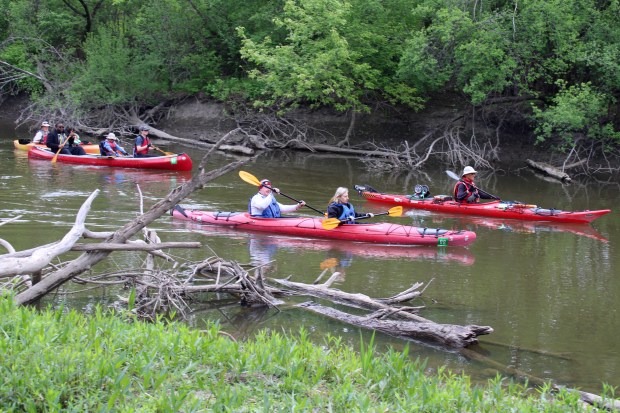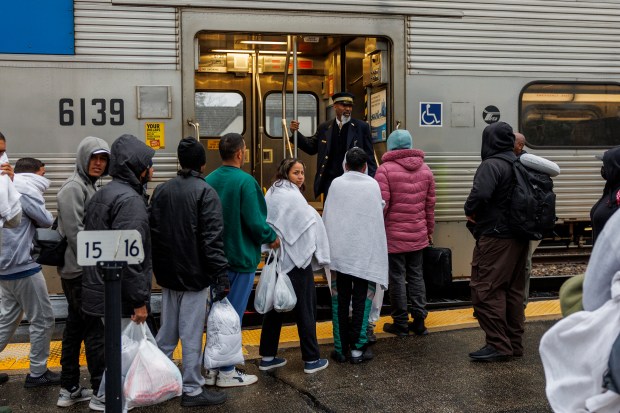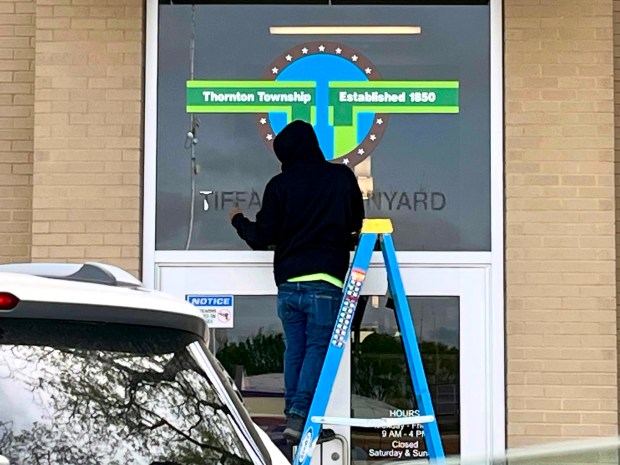Hundreds gathered Sunday morning under cloudy late spring skies to take part in the 68-year tradition of paddling the Des Plaines River.
The Des Plaines River Canoe & Kayak Marathon is the largest race of its kind in the Midwest, organizers say, and the second oldest, single-day, continual canoe race in the United States.
Canoes, kayaks, paddle boards and their paddlers, all gathered at the Des Plaines River launch in Libertyville, just off West Old Spring Road for a first heat 8 a.m. start time, before paddling the 18.5-mile course, (unchanged from its historic beginnings), to the end in Cook County at Dam #2 near Mount Prospect.
Race Chair Al Pilgrim says this event is open to everyone — first-time participants, repeat paddlers, and serious competitors.
“With a choice of 22 different class specifications and two course distances, this is a sanctioned race with many classes of racers from Olympic level competitors to beginners, open to all ages, all levels of experience, and to most boat and board types,” Pilgrim said.
According to Pilgrim, a Minithon option was added in 2014, which continues to offer a shorter, simpler route to participants, a 5.25-mile route, with the same finish line as the 18.5-mile Marathon, for those looking for a more leisurely entre to river racing.
Sunday’s Minithon began at Pottawattamie Woods and finished in Cook County, near Mount Prospect.
The historic Des Plaines River Canoe & Kayak Marathon is co-sponsored each year by the Des Plaines River Association, the Forest Preserve District of Cook County, and the Lake County Forest Preserves, Pilgrim says, along with participation from many other organizations.

The Northwest Passage of Wilmette is one of these, a long-time Canoe Marathon sponsor, says Chris Paustian, communications director and guide at The Northwest Passage, who also participated in Sunday’s race.
“At Northwest Passage, we encourage the next generation of paddlers and support multigenerational adventure. This event is really in line with our mission to get as many kids out on the water as safely as possible,” Paustian said.
Bill McDermott, Marathon board committee member and race day start line manager, says water levels over the weekend reached a 30-year record low, which means the river flows more slowly, which will lengthen race times.
Trophies are awarded to winners in various classes, but overall, this year, winning racers were able to complete the course in just under 3 hours.

“The Des Plaines River Marathon Trophy is modeled after Des Plaines River Canoe & Kayak Marathon founder, Ralph Frese, a fifth-generation blacksmith, historic reenactor, and wilderness activist, who made boats for the Scouts when he started the race in 1958,” McDermott said.
According to McDermott, Daniel Burnham’s original vision for Chicago included not only excellent lakefront access but the preservation of the green space along the river on the west side of the city and along the suburban forest preserves.
“The Des Plaines River course we race today runs through the green belt of local wilderness, providing fish, beaver, otters, raccoons, migratory bird path, and game trail in our area,” McDermott said.

Grace Sinopoli and Marie Hoeger of Arlington Heights say this is their first time doing the Des Plaines River Marathon since they did it together as teens in 2011.
“We’ve been wanting to get out here again to re-experience this feat of endurance together, to spend time out on the river, and to enjoy the journey, that’s really what we are here for,” Sinopoli said.
Gina Grillo is a freelancer for Pioneer Press.





